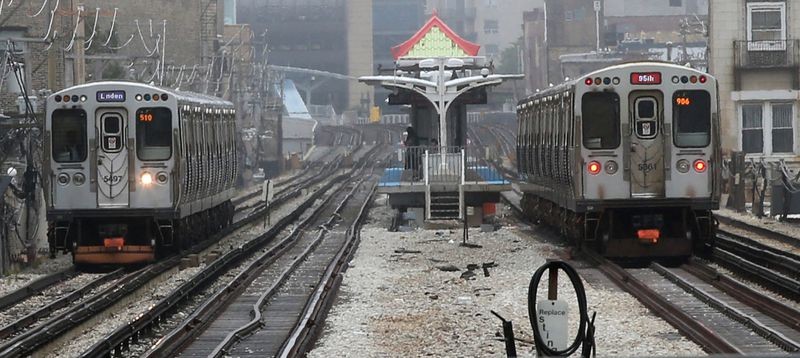Mary Wisniewski | Chicago Tribune
CTA riders will be spared fare hikes and service cuts for a second year in a row in 2020, and will see some new rail cars and buses, along with track and station improvements.
The CTA on Thursday proposed a $1.57 billion operating budget for next year, an $18.4 million increase over last year’s budget, due to increased costs for labor and security, the agency said.
The CTA also proposed a five-year, $5.1 billion infrastructure plan, which will include the purchase of new rail cars and buses, track and station upgrades and design and preliminary engineering work for the planned Red Line extension from 95th Street to 130th Street.

Photo taken by Antonio Perez, Chicago Tribune
Funds also will go toward making more CTA stations accessible for the disabled, beginning with the Austin station on the Green Line and California and Montrose stations on the Blue Line. Construction at Austin is expected to begin late next year or early in 2021, while the schedule for California and Montrose is still being determined, said CTA spokesman Brian Steele.
The infrastructure budget is almost $2 billion higher than the five-year plan proposed last year, thanks to an influx of funding from the state infrastructure bill, which hiked gas taxes to help pay for road and transit improvements.
“This will help us continue to modernize the system and improve services throughout the communities we serve,” said CTA Chief Financial Officer Jeremy Fine in an interview.
The CTA is still looking for more state funds to help with the cost of free and reduced fares for seniors, students, people with disabilities and those in the military.
Ridership dropping
The agency expects to see a continued drop in ridership, due in part to competition from ride-share and low gas prices. Ridership has dropped 16.3% since a record high in 2012, from 545.6 million riders to a projected 456.9 million this year.
Ridership is expected to fall another 1.8% in 2020 to 448.7 million, with bus ridership down 1.3% and rail ridership dropping 2.3%. Rail ridership is expected to fall due in part to increased construction, but should improve once projects are complete, Fine said.
Ridership on public transit is dropping around the country, and is at its lowest level since 2006, according to the CTA, citing the American Public Transportation Association.
Mayor Lori Lightfoot last week announced a proposal to increase ride-share fees to as much as $3 for solo trips in and out of downtown during peak hours, which if approved would mean Chicago would have the highest ride-share tax in the country. Lightfoot said the increase targets downtown congestion, and she wants to direct some of the money to the CTA to improve bus service.
New buses, train cars
Along with continued work on the massive Red-Purple Line Modernization project, track and signal repairs along the Blue Line, and construction of a new station on the Green Line at Damen Avenue and Lake Street, CTA riders also will see some new buses and rail cars.
By the end of this year, the agency will add six new electric buses, part of a purchase of 20. The agency already has two electric buses. Besides lowering emissions, the CTA says the new buses offer savings in both fuel and maintenance costs.
Riders also will see new train cars on the system for testing next year, according to the CTA. The agency will start testing 10 prototypes of new 7000 series cars built at the CRRC Sifang America factory on the Far South Side. If the cars perform well, CRRC will increase production to make up to 846 cars.
The last batch of new cars, the 5000 series, came onto the system between 2011 and 2015, Steele said.
The new cars will have a different seating arrangement than the last batch of CTA cars, known as the 5000 series, which have mostly aisle-facing, New York-subway-style seating. The seats proved unpopular with many riders.
Metra and Pace also have introduced 2020 budgets without fare increases.
The CTA will hold a public hearing on its proposed budget at 6 p.m. Nov. 13 at its downtown headquarters at 567 W. Lake St. The CTA board will vote on the budget Nov. 20.
Source: Chicago Tribune